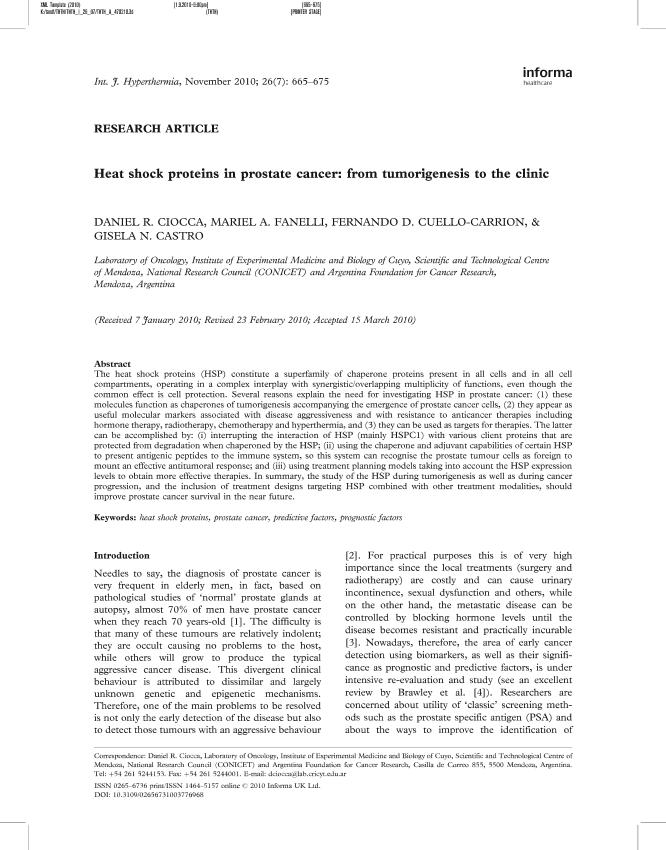Artículo
Heat shock proteins in prostate cancer: From tumorigenesis to the clinic
Ciocca, Daniel Ramon ; Fanelli, Mariel Andrea
; Fanelli, Mariel Andrea ; Cuello Carrión, Fernando Darío
; Cuello Carrión, Fernando Darío ; Castro, Gisela Natalia
; Castro, Gisela Natalia
 ; Fanelli, Mariel Andrea
; Fanelli, Mariel Andrea ; Cuello Carrión, Fernando Darío
; Cuello Carrión, Fernando Darío ; Castro, Gisela Natalia
; Castro, Gisela Natalia
Fecha de publicación:
12/2010
Editorial:
Informa Healthcare
Revista:
International Journal Of Hyperthermia
ISSN:
0265-6736
Idioma:
Inglés
Tipo de recurso:
Artículo publicado
Clasificación temática:
Resumen
The heat shock proteins (HSP) constitute a superfamily of chaperone proteins present in all cells and in all cell compartments, operating in a complex interplay with synergistic/overlapping multiplicity of functions, even though the common effect is cell protection. Several reasons explain the need for investigating HSP in prostate cancer: (1) these molecules function as chaperones of tumorigenesis accompanying the emergence of prostate cancer cells, (2) they appear as useful molecular markers associated with disease aggressiveness and with resistance to anticancer therapies including hormone therapy, radiotherapy, chemotherapy and hyperthermia, and (3) they can be used as targets for therapies. The latter can be accomplished by: (i) interrupting the interaction of HSP (mainly HSPC1) with various client proteins that are protected from degradation when chaperoned by the HSP; (ii) using the chaperone and adjuvant capabilities of certain HSP to present antigenic peptides to the immune system, so this system can recognise the prostate tumour cells as foreign to mount an effective antitumoral response; and (iii) using treatment planning models taking into account the HSP expression levels to obtain more effective therapies. In summary, the study of the HSP during tumorigenesis as well as during cancer progression, and the inclusion of treatment designs targeting HSP combined with other treatment modalities, should improve prostate cancer survival in the near future.
Palabras clave:
Heat Shock Proteins
,
Predictive Factors
,
Prognostic Factors
,
Prostate Cancer
Archivos asociados
Licencia
Identificadores
Colecciones
Articulos(IMBECU)
Articulos de INST. DE MEDICINA Y BIO. EXP. DE CUYO
Articulos de INST. DE MEDICINA Y BIO. EXP. DE CUYO
Citación
Ciocca, Daniel Ramon; Fanelli, Mariel Andrea; Cuello Carrión, Fernando Darío; Castro, Gisela Natalia; Heat shock proteins in prostate cancer: From tumorigenesis to the clinic; Informa Healthcare; International Journal Of Hyperthermia; 26; 8; 12-2010; 737-747
Compartir
Altmétricas



